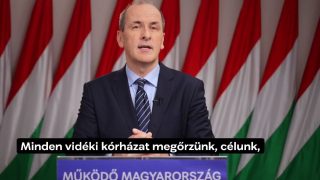Oleksiy Anulja recounts unemotionally the events that had taken place over these ten months. He speaks for about an hour and forty minutes – without showing any feelings. Having finished, he also mentions that he feels indeed nothing since returning to his family at the end of 2022, which is the hardest part of it all. Or rather, there is one thing that was even more difficult: that his children –now five and nine years old – did not recognize him upon returning home.
The now disabled soldier of the Ukrainian army also says that it is easier for him to share his experiences with strangers than it is with family members, to whom he still has not told everything regarding his ten-month captivity at the hands of the Russians. Of the severely tortured prisoners of war, he is almost the only one still living with his family; most of the others’ marriages have already ended since their return from Russia.

Tooth extraction – without anaesthesia
Oleksiy spoke about his ten-month captivity on a Wednesday evening at the Blinken OSA Archive on Arany János Street, a part of the Central European University (CEU) still remaining in Budapest. He later told 24.hu that it is not his own personal story that is important, and that is not the reason why he is giving lectures, but to raise worldwide awareness about the fate of Ukrainian soldiers and civilians who have been captured by the Russians.
István Balog, chargé d’affaires at the Ukrainian Embassy in Hungary, told us that on the 812th day of the war, they wanted to show what the „Russian world that is incomprehensible by common sense” is truly like. Balog stated that Ukrainian authorities are collecting data on the torture of captives and will submit their findings to the International Criminal Court in The Hague. The data suggests that the Russians did not adhere to the Geneva Conventions regarding prisoners of war.
Ukrainian authorities are also documenting the condition in which prisoners of war are returning home. Oleksiy’s case is a harrowing example of the kind of information the authorities must register. Before his capture, Oleksiy ran 15 kilometres a day, could do 37 pull-ups, and worked as a bodyguard for security services, professionally protecting politicians and businessmen. Today, due to the torture, he cannot even raise his hand above his chest, and can barely move his shattered, flattened fingers.
They extracted two of his teeth without anaesthesia – the dentist who initially refused to perform the operation was threatened with being reported for sympathising with a Ukrainian.

After having his teeth pulled out, blood was pouring from Oleksiy’s mouth, but he was ordered to carry a bucket of sand around. When he spat the blood that had accumulated in his mouth onto the sand, he was beaten for “dirtying Russian soil”. They took him away to be „executed” and were also preparing to rape him, but an explosion caused his captors to flee.
All this happened while he was still in Ukraine. Later, he was transferred to other prisons – also in Russia – and was regularly beaten, starved, electroshocked, tortured, and held in solitary confinement for 108 days, he said.
Handed over to the Russians by a Ukrainian woman
He also spoke about the psychological and ideological pressure the Russians subjected them to. For example, the Ukrainian prisoners of war were forced to kiss the busts of Lenin and Stalin, as well as Beria (Stalin’s chief of internal affairs), Russian President Putin, Dzerzhinsky (the founder of the Soviet-Russian Cheka, the predecessor of the Soviet NKVD and KGB, and today’s Russian FSB), and Tsar Nicholas II (who was killed by the Bolsheviks).
Oleksiy Anulya can also be found online under the name Oleksii Anulia. One of his videos with English subtitles has been viewed 1.3 million times.
According to Oleksiy, the reason why Ukrainian civilians could also end up in Russian prisons was that in early 2022, in the region where he had been fighting, the Russian invaders did not really take prisoners of war.
Ukrainian soldiers were simply shot on the spot, and the attackers took civilians with them in their stead. The civilians were later forced to sign papers stating that they were members of Ukrainian territorial defence units. Anulya himself only survived the initial few minutes following his capture because he did not look like a soldier. Having realised that he actually was one, the Russians found that his belt had the inscription “Pentagon”, leading them to believe he was American, so they took him to interrogators instead. (Anulya does not speak English, as we experienced first-hand after his lecture in Budapest.)
His capture was more of a case of bad luck. After unsuccessfully trying to defend the village of Lukashivka against the 388 Russian attacking units and about five thousand invading Russian soldiers, Oleksiy hid in a muddy, trash-filled ditch for 12 hours. He was also injured during the fight; despite 49 pieces of shrapnel hitting his face, skull, and jaw, and also suffering injuries to his right hand, he managed to reach a neighbouring Ukrainian village. There, a Ukrainian woman reported him to the occupying Russian troops.
While in Russian captivity, Oleksiy feared that his children would never know if he was killed and that his body would never be found. He dreaded that his remains would be fed to dogs, preventing a proper burial. Towards the end of his captivity, he even contemplated suicide. At that point, his grandmother – who had died shortly before the outbreak of the war – appeared to him, giving him the strength to carry on. A few days later, just before New Year’s Eve 2022, Oleksiy was released.
On his phone, the Ukrainian soldier also showed us images of a Russian tank he had destroyed in Lukashivka – back before his capture. Oleksiy had been serving in a ten-member reconnaissance unit, comprising of former or active athletes like him. He himself had won the kickboxing championship of the Commonwealth of Independent States (the former Soviet republics) many years ago.

He is the only one still alive of the seven athletes who had served in the reconnaissance unit. This is also partly due to his martial arts background: during his captivity in Ukraine, he encountered a former kickboxing rival, who – as a Russian soldier – gave him what little help he could and arranged for him to be transferred to Russia’s Kursk region. This probably saved his life, as prisoners of war who remained in the occupied territories of Ukraine had much lower survival rates.
Anulya spoke for an hour and forty minutes. However, afterwards, one of his acquaintances told the audience that he had omitted a lot.
Oleksiy was not only a participant in a real and gruesome war fought with weapons. Currently – as a disabled veteran – he is also an active part of a propaganda conflict. His goal is to counter Russian propaganda and show the world what the Russian system he fought against is really like. He emphasises that he did not fight against the Russian people, and it is not the Russian people he is trying to produce counter-propaganda against. In his view, many nationalities live in both Ukraine and Russia, and he is fighting against a system, a regime – not a nation. Additionally, Oleksiy is writing a book to tell his story, and a film about him is also likely to enter production in the future.
Children raised for war
Ever since the Russian invasion that began in February 2022, a propaganda war has also been waged – from both sides. CNN has reported recently that the U.S. government fears the Kremlin will intensify its propaganda campaign against President Volodymyr Zelensky. Regarding Russian propaganda, the OSA Archive hosted another lecture by Transcarpathian-born Mykhailo Dankanych, producer, soldier and propaganda expert for the CAU (Community Army of Ukraine).
In his lecture, Dankanych primarily analysed the workings of Russian propaganda. According to him, this activity did not begin in 2022 with the full-scale invasion, nor in 2014 with the Russian annexation of Crimea, and not even with the 2004 Orange Revolution in Kyiv. In fact, the propaganda war started in 1997, following the conflict between the Russians and Chechens, the first Chechen war. As per Dankanych, Russian children are raised for war from an early age. They are taught that „life is war”.

Dankanych believes the main goal of Russian propaganda is to have us “believe in lies” and „doubt the truth”, and to ultimately create an „alternative reality.” He claims that six billion dollars are spent annually on this effort, aiming to influence not only the Russian population but also the outside world. He cited a statistic that 88 per cent of all information manipulation in the EU is the result of Russian activity.
Since 2002, 88 feature films have been made in Russia with the main goal of fostering hatred for the enemy and laying the groundwork for information warfare. The specific aim is to convince Russians and the world that Ukrainians are thieving fascists, while Russians are a tight-knit people desiring to live in peace and harmony – even with Ukrainians. Meanwhile, efforts have been made to undermine Ukraine’s international reputation and economic operations. Most importantly, the propagandists’ outmost efforts aimed to ensure that the enemy would not anticipate the attack – in the next step, the soldiers followed.






